The controversial issue of Muslim girls wearing 'hijab' in educational institutions, which had hit national headlines last year with a government pre-university college in Udupi banning it inside classrooms, does not appear to be a serious campaign issue for the May 10 elections to the Karnataka assembly.
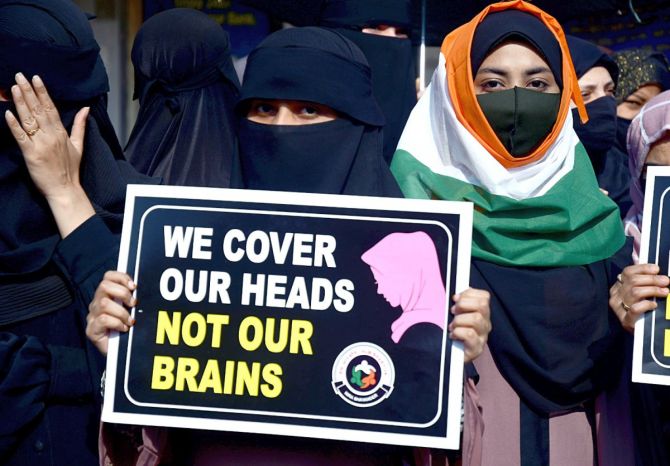
The Bharatiya Janata Party government in the state had in an order last year banned wearing of hijab inside campuses after the controversy broke out, saying 'any clothing that would disturb equality, integrity and public law and order' will not be allowed.
Students were directed to wear only the uniforms prescribed for them in schools and pre-university colleges.
The order was passed after several hijab-wearing girls in the state were denied entry into educational institutions wearing hijab. The move had led to widespread protests across the country.
The Karnataka high court upheld the government order after a few Muslim girl students moved the court.
The judgement was then challenged before the Supreme Court, which subsequently delivered a split verdict in October.
The matter will be later heard by a larger bench.
BJP's poster boy of the hijab row, Yashpal Suvarna, is now the party's candidate for the Udupi assembly constituency.
When the row broke out, he was vice-president of the development committee of the Udupi government PU college for women.
The incumbent MLA Raghupati Bhat, who was president of the committee, was replaced by Suvarna, a Mogaveera (fishermen community) leader and firebrand activist who has a strong support base among the party cadre.
Suvarna says the controversy was a creation of 'anti-national and anti-social' elements, who did not want Muslim girls or even poor Hindu students to be educated.
"Prime Minister Narendra Modi's governance and the development initiatives of the BJP government will be my campaign agenda," Suvarna said.
He said the banned Popular Front of India was responsible for creating unrest in the Dakshina Kannada region over the hijab issue. Otherwise, Udupi is a place of peace-loving people.
Suvarna said the Popular Front of India, its student outfit Campus Front of India and the Karnataka Forum for Dignity created the issue because they did not want girl children to be educated.
"They wanted to divert the attention of the economically poor students at government PU college," he said.
However, the hijab issue is not being taken up actively during the election campaign and the BJP is focussing on the development plank.
If any party is secretly turning hijab into a campaign issue, it is the Social Democratic Party of India, the political arm of the banned PFI.
Political observers say they are the actual beneficiary of the issue with which they are trying to stir up emotions among the Muslim community.
The Congress leaders are also not highlighting the issue in their campaign.
Opposition deputy leader UT Khader, who was blamed for taking an ambivalent stand when the row surfaced, said he believes that everyone should follow the rule and laws of the land to maintain peace and harmony.
He said the issue was initially limited to one college, while other colleges allowed students to wear hijab.
But the brainwashing by some organisations led to six students in Udupi to revolt against the college after following the rules of the college for more than a year.
Dubbed as the laboratory of Hindutva politics, Dakshina Kannada and its twin district Udupi, have already been communally polarised.
The BJP registered a big victory in the last assembly elections, bagging 12 out of 13 seats in the two districts.
Vishva Hindu Parishad leader Sharan Pumpwell says that Hindus have only one party to look up to and it is the BJP.
The SDPI is trying to cash in on the hijab controversy and only their hardcore workers who will go after them, he said.
According to social activist MG Hegde, the SDPI has certainly been affected by the ban on PFI and other allied organisations.
He plays down SDPI's impact on the elections, while other analysts say their presence can divide the votes of minorities which will adversely affect the Congress.
Udupi BJP president Kuyilady Suresh Naik said the party is working at the ground level and is focussing on development politics.
One round of campaigning is over and WhatsApp groups are being used at the booth-level to connect with the voters, he said.
Dakshina Kannada district BJP president Sudarshan Moodbidri said his party is confident of winning all eight segments in the district.
With a visible anti-incumbency factor on the ground, BJP leaders are also trying not to focus more on communal issues, knowing full well that the consolidation of Hindu votes in their favour is intact in the region.
Former Chief Minister B S Yediyurappa had also recently remarked that controversies around Muslims students being banned from wearing the hijab in college and the sale of halal meat in the state were unnecessary.
"Hindus and Muslims should live like brothers and sisters. From the beginning, I have taken this stand," he said in a recent statement.
Curiously, the SDPI does not have a candidate in Udupi constituency, where the hijab issue originated, while they have a candidate in Kaup in the district and four in Dakshina Kannada.
The Congress is wary of their virulent communal campaign in Muslim pockets, especially in Puttur and Mangaluru constituencies.
In Puttur, the party has fielded Shafi Bellary, one of the accused in the murder of BJP youth wing leader Praveen Nettaru.
However, Congress candidate in Mangaluru, UT Khader says they are not worried about SDPI's presence in his constituency.
"The voters here know me and my work," he said.
"The SDPI has fielded candidates where the party has influence and our presence will be registered," said SDPI general secretary Abdul Latheef Puttur.
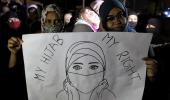
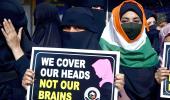
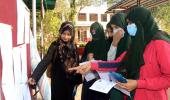
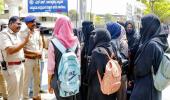








 © 2025
© 2025